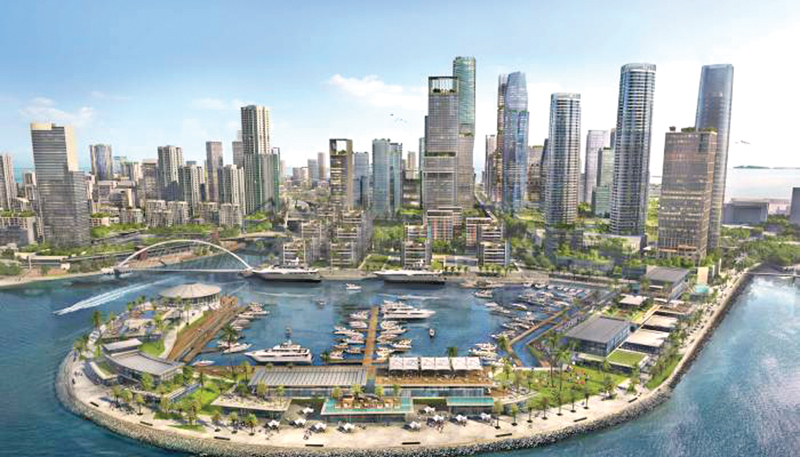 Sri Lanka finds itself at a crossroads as the world is rapidly shifting from being dominated from one centre of power to multipolarity. Its exports, which have changed little from the early 1990s, are aimed at the US and the EU, while other fast growing Asian economies have rapidly industrialised and are producing goods for other emerging markets with enormous growth potential.
Sri Lanka finds itself at a crossroads as the world is rapidly shifting from being dominated from one centre of power to multipolarity. Its exports, which have changed little from the early 1990s, are aimed at the US and the EU, while other fast growing Asian economies have rapidly industrialised and are producing goods for other emerging markets with enormous growth potential.
In a recent webinar titled “Geopolitical Fallout: Multipolarity and the Erosion of U.S. Dominance,” organised by Tricontinental: Institute for Social Research, offers key insights directly applicable to Sri Lanka’s current economic and geopolitical challenges. Panellists provided diverse perspectives on China’s rise, the decline of U.S. hegemony, the emergence of regional blocs, and the possibility of global de-dollarisation. For Sri Lanka, these discussions underscore the importance of carefully balancing geopolitical interests, diversifying economic partnerships, and strengthening regional cooperation.
China–U.S. rivalry and strategic hedging
Prof. Sunanda Sen, a national fellow of the Indian Council of Social Science Research, contextualised the geopolitical transformation by tracing its historical roots, and highlighted how the rise of China fundamentally challenges the U.S.-led global order.
Since Deng Xiaoping’s reforms in 1978, China has grown exponentially, becoming the second-largest economy in the world. Its substantial foreign exchange reserves, invested in U.S. Treasury bonds until quite recently, ironically sustained America’s economic model, even as geopolitical tensions between the two intensified. Xi Jinping’s policy shift toward “dual circulation,” emphasizing domestic economic resilience, indicates that China will no longer defer to U.S. economic interests.

Prof. Sunanda Sen

Dr. Farwa Sial
Samuel King, researcher and writer for Red Spark, an Australian Marxist pre-party formation, added that China’s role in undermining Western monopolies, particularly through innovations in electric vehicles, solar panels, and advanced batteries has given developing nations an opportunity to access technology at an affordable price. China’s economic rise does not necessarily equate to imperialist dominance but rather poses a direct threat to established Western monopolies, he said.
Sri Lanka, situated strategically in the Indian Ocean, has seen US and its allies in the region try to obstruct Chinese backed projects such as the Hambantota Port and Colombo Port City. Policymakers and scholars from the West and neighbouring India have tried to portray Sri Lanka as overly reliant on Beijing. However, the recent U.S. tariffs on Sri Lankan exports, part of Trump’s broader protectionist resurgence, has illustrated where Sri Lanka’s true dependance and vulnerability lies.
Sri Lanka must, therefore, adopt careful strategic hedging, cultivating robust economic relationships with both major powers without compromising national sovereignty.
Debt, dollar dependency, and the need for diversification
The global push towards de-dollarisation discussed in the webinar is particularly relevant for Sri Lanka, which recently endured a severe economic crisis exacerbated by its reliance on dollar-denominated debt. Panellists argued that continued dependency on the U.S. dollar leaves developing countries susceptible to external economic shocks, often necessitating harsh conditionalities from international institutions such as the International Monetary Fund (IMF).
Prof. Sen noted the growing momentum within BRICS countries to conduct trade and financial transactions in local currencies and the expansion of BRICS to include countries such as Egypt and Ethiopia signals a strong desire among developing nations to create alternatives to traditional Western-dominated financial structures.
For Sri Lanka, heavily burdened by foreign debt, much of it dollar-based, exploring regional currency arrangements could offer critical relief. The recent IMF conditions attached to bailout packages underscored Sri Lanka’s limited policy autonomy. Moving towards greater financial diversification, including mechanisms offered by BRICS or ASEAN, could provide Sri Lanka with more stable, flexible financing alternatives.
Missed opportunities in regional cooperation
Panellist Dr. Farwa Sial, a political economist from SOAS, University of London, highlighted that effective regional cooperation has been underutilised by developing countries, particularly within South Asia. She contrasted ASEAN’s robust attempts at regional economic integration post-1997 Asian financial crisis, with South Asia’s less effective regionalism under SAARC and BIMSTEC.
Sri Lanka’s limited engagement with regional economic frameworks represents a missed opportunity. Despite its geographical advantage, positioned as a maritime hub connecting South and Southeast Asia, Sri Lanka has historically been cautious about regional commitments due to geopolitical apprehensions, particularly concerning India and China.
However, ASEAN’s successful bilateral swap arrangements and regional trade integration via agreements like the Regional Comprehensive Economic Partnership (RCEP) show how small and medium-sized economies can strategically navigate global economic turbulence. For Sri Lanka, actively pursuing stronger trade relations within BIMSTEC or revitalizing SAARC could serve as platforms to mitigate geopolitical risks, diversify trade, and assert greater collective bargaining power in global negotiations.
South–South cooperation and strategic realignment
The panellists also highlighted a shift towards South – South cooperation, noting that developing nations increasingly seek economic autonomy from traditional Western dominance. The Alliance of Sahel States, Mali, Burkina Faso, and Niger, emerged in response to Western economic and political interventions, asserting collective sovereignty and pursuing economic cooperation independently from former colonial powers.
Sri Lanka, still heavily reliant on traditional markets and Western financial institutions, should closely observe these emerging dynamics. The creation of alternative economic alliances focused on mutual support, shared development objectives, and reduced dependency on Western-dominated financial systems could offer viable economic partnerships.
Developing stronger ties with Africa, Latin America, and regional Southeast Asian economies could enable Sri Lanka to diversify export markets, attract investment in non-traditional sectors, and create new sources of development financing.
Technological dependency and economic vulnerabilities
Finally, Samuel King’s insights on technological monopolies and labour markets highlight an essential area of vulnerability for Sri Lanka. King argued that imperialist dominance historically depended on controlling innovation and maintaining technological monopolies. While China challenges these monopolies by producing simplified, cost-effective technologies, the Global South, including Sri Lanka, remains predominantly positioned in low-value-added economic sectors.
Sri Lanka’s economic vulnerability arises from its lack of technological innovation and continued dependency on imports of advanced technologies and manufactured goods. To break this cycle, Sri Lanka must invest in technological capabilities, foster innovation, and prioritise industries offering higher value addition.
By emulating China’s model of innovation through simplification, producing accessible, affordable technology, Sri Lanka can reduce import dependency, foster domestic innovation, and integrate into higher-value global supply chains.
Policy pathways and strategic autonomy
The Tricontinental webinar’s analysis suggests clear policy pathways for Sri Lanka:
• Balanced diplomacy – Avoid being drawn into geopolitical rivalries by engaging constructively with major global powers. Sri Lanka should assert neutrality while pragmatically managing relationships with China, the U.S., India, and emerging regional blocs.
• Financial diversification and de-dollarisation – Pursue mechanisms to reduce dollar dependency, explore local currency trading arrangements, and engage with new financial structures emerging from BRICS and regional alliances.
• Enhanced regional cooperation – Strengthen commitments to regional economic frameworks like BIMSTEC and SAARC, emulating ASEAN’s successes. Such regional integration can provide crucial economic stability and collective diplomatic strength.
• South–South cooperation – Actively seek partnerships in Africa, Latin America, and Southeast Asia to diversify economic relationships away from traditional Western-centric models.
• Technological innovation and economic upgrading – Invest in research, development, and education to foster innovation and technological self-sufficiency. Emulate successful models from Global South countries that have effectively challenged technological monopolies.
The transition to a multipolar world offers Sri Lanka both challenges and opportunities. By carefully balancing geopolitical rivalries, diversifying economic relationships, and investing in domestic capacities and regional partnerships, Sri Lanka can better position itself for stability and growth. However, achieving these goals requires clear-sighted leadership, pragmatic policies, and strategic foresight, qualities essential for navigating an increasingly complex global landscape.







